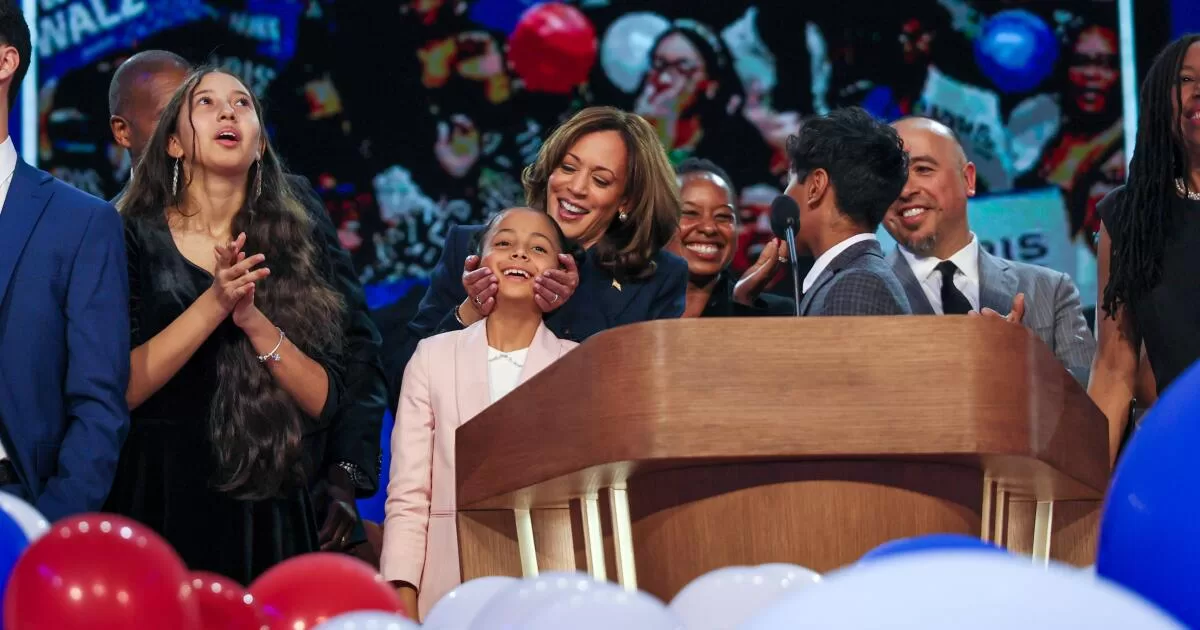Show, don’t tell.
Three words that every journalist hears, with infuriating regularity, from professors, editors and readers.
The dictate is not exclusive to journalism; it’s shared by prosecutors, politicians and anyone who’s ever given a PowerPoint presentation about anything.
This week, Democratic presidential nominee Kamala Harris, vice presidential nominee Tim Walz and many other luminaries at the Democratic National Convention proved just how important, and effective, that simple rule can be.
In accepting her nomination, Vice President Harris did not mention, much less lean into, the historic nature of her potential presidency: first woman; first Black woman; first person of Indian, and Jamaican, descent. (As long as we’re counting, she’d also be the first Democratic president from California.)
She didn’t point out the perils of the glass ceiling, or tell voters how important representation and an array of voices are to a nation as diverse as the United States.
She showed them.
Over four days, a powerful lineup of speakers, known and unknown, proved that despite Harris being demographically unique as a presidential candidate, she is more interested in pointing out that she is one among many.
Many extraordinary women, Black and brown people and children of immigrants. Many extraordinary people who see diversity as the definition of what it means to be an American rather than a threat to our country’s identity.
And many voters who are tired of the Republicans claiming to be the party of family values, faith and patriotism.
Harris and her party did not preach about the “importance of family,” they illuminated it.
Families were celebrated at every turn. Harris, like Michelle and Barack Obama, spoke movingly about being shaped by the love and influence of their mothers, fathers, in-laws and chosen families. Doug Emhoff spoke of Harris’ role as “Momala” in their blended family; his ex-wife produced the video, narrated by his son Cole, that introduced him. Walz’s wife Gwen laughed knowingly at a joke about her husband’s well-worn flannel shirts.
Parents, and survivors, spoke passionately about the tragic impact that gun violence and diminished reproductive rights have on families; no less than Oprah Winfrey pushed back against JD Vance’s absurd attacks on “childless cat ladies.”
Children played a key role in the convention and not just as talking points or photo ops. Harris’ nieces offered instruction in how to pronounce her first name, and no vice presidential candidate in history has received a more thorough “family values” vetting than Walz did when his son Gus leapt from his seat to yell, through tears, “That’s my dad!”
Neither did Harris and her party bellow about their patriotism; they underscored it. Most obviously with a sea of flags that made Chicago’s United Center look like a Fourth of July parade, and a procession of veterans, including Walz, who spoke of the importance of honoring those who serve. More important, Harris and her party wrested love of country away from those who would define it by nationalism, isolationism and divisive definition of “real Americans.”
There was no talk of “inclusion,” just a sea of faces, on and offstage, that illustrated the unlimited possibility offered by the word “American.” Speech after speech evoked this country as a magnet, drawing those who seek freedom, opportunity and safety.
Harris’ oft-repeated story of how, as a prosecutor, she always identified herself as “for the people” provided a constant, intentional invocation of the Declaration of Independence. And she, like many other of the convention’s speakers, reminded voters that a true patriot’s allegiance must be to the Constitution.
Anyone who has bought into the Republican condemnation of Democrats as the “godless” left was no doubt surprised by the welter of references to many faiths. Emhoff spoke of how he and Harris celebrated both Christian and Jewish traditions. Sen. Raphael Warnock (D-Ga.), who is also the pastor of Atlanta’s historic Ebenezer Baptist Church, referred to voting as a “kind of prayer”; Rep. James Clyburn (D-S.C.) quoted Corinthians; the “golden rule” found in many religions was referenced often.
But so was the right not to worship; the separation of church and state is as key to our democracy as the notion that all people are created equal.
The vice president did vow, as every presidential candidate inevitably vows, to work “across the aisle” and fight for all Americans, regardless of their party affiliation. But she also showed it.
Never before have so many registered Republicans spoken at a Democratic National Convention, never before have so many self-identified conservatives called on their peers to support a candidate whose opponent has unfailingly denigrated her as “liberal.”
The words and actions of the Republican candidate, former President Trump, were certainly a catalyst for such high-profile conversions, and some Democrats were dubious about the decision to showcase “proud conservative” former Rep. Adam Kinzinger (R-Ill.) or former White House press secretary Stephanie Grisham, who considered herself a member of the Trump family until Trump refused to call off the mob attacking the Capitol on Jan. 6, 2021.
But Kamala Harris understands that you can’t just tell people that you want to unite all Americans. You have to show them it can be done.
As she has said before, it’s not enough to talk the talk, you have to walk the walk, and in the aptly named United Center, Harris did both.
